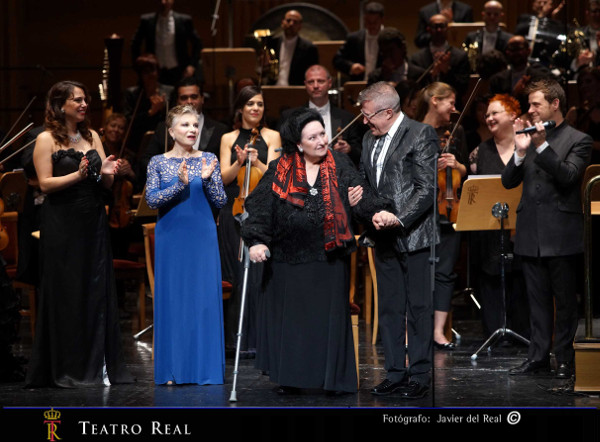Omaggio a Montserrat Caballé
L'ultimo Gala in onore del grande soprano aveva avuto luogo al Teatro Real nel 2014
Il Teatro Real esprime il suo profondo cordoglio per la scomparsa di Montserrat Caballé, senza dubbio uno dei più grandi soprani di tutti i tempi. La recita del 6 ottobre di Faust le è stata dedicata come tributo simbolico alla sua statura artistica.
La straordinaria carriera di Montserrat Caballé rappresenta uno dei capitoli più brillanti nella storia dell'arte lirica. La bellezza unica e l'estensione della sua voce, la ricchezza inesauribile della sua gamma di colori, la tecnica prodigiosa, l'espressività della sua immacolata linea di canto, l'incredibile plasticità drammatica delle sue performance vocali, combinata alla sua scalpitante curiosità verso opere sconosciute o dimenticate hanno posto il suo nome nell'Olimpo dei più grandi cnatanti della seconda metà del XX secolo.
L'ultimo grande Gala in omaggio a Montserrat Caballé ha avuto luogo al Teatro Real il 9 dicembre 2014. Ben noti soprani legati in un modo o nell'altro alla celebre artista di Barcellona hanno interpretato brani che ricordavano i suoi trionfi a Madrid e le sue inestimabili intepretazioni del Belcanto romantico.
Montserrat Caballé rappresenta una pietra angolare nella storia del Teatro Real fin dai tempi in cui era attivo come sala da concerti, con indimenticabili interpretazioni di Vivaldi, Granados o Bellini. Sull'attuale palcoscenico del Teatro Real, dopo la riapertura nel 1997 come teatro d'opera, Montserrat Caballé ha offerto un recital il 2 luglio 1998 e interpretato il ruolo eponimo nell'esecuzione oratoriale dell'opera Cléopâtre di Jules Massenet nel decembre 2004.
THE TEATRO REAL DEDICATED TO MONTSERRAT CABALLÉ THE OCTOBER 6th PERFORMANCE OF ‘FAUST’
The last Tribute Gala to the great soprano took place at the Teatro Real in 2014
The Teatro Real deeply mourns the demise of Montserrat Caballé, who was undoubtedly one of the greatest sopranos of all time. The october 6th performance of Faust was dedicated to her as a symbolic tribute to her greatness.
Montserrat Caballé's outstanding artistic career is one of the most brilliant ever written in the history of world lyric art. The unique beauty of her long-range voice, the neverending richness of her tone's palette of colours, her prodigious technique, the expresiveness of her polished singing line, the incredible dramatic plasticity of her vocal performances, combined with her eagerness to explore unknown or forgotten works, have placed her name in the exclusive gallery of the greatest singers of the seconf half of the 20th century.
The last great Tribute Gala to Montserrat Caballé took place at the Teatro Real on 9 December 2014. Well-known sopranos linked in one way or another with the famous Barcelona-born singer performed pieces aiming to recall her triumphant evenings in Madrid and her peerless performances of the Romantic belcanto repertory.
Montserrat Caballé is a cornerstone in the history of the Teatro Real since the time it served as a concert hall, with unforgettable performances of composers such as Vivaldi, Granados or Bellini. In the current stage of the Teatro Real, after being reopened in 1997 as an opera theatre, Montserrat Caballé offered a concert on 2 July 1998 and performed the title role in a concert performance of the opera Cléopâtre by Jules Massenet in December 2004.
BIOGRAPHICAL NOTES
After her first steps, in the 50s, in the Teatro Fortuny in Reus, her performances in the Municipal Theatre Company in Basel between 1956 and 1960, and the contract with Bremen Opera from that year, Montserrat Caballé’s glowing career took off in New York, when, in 1965, she replaced Marilyn Horn in the leading role of Lucrecia Borgia, by Donizetti, at Carnegie Hall. At the end of the first aria, the audience gave her an ovation of twenty minutes and at the end of the performance her meteoric artistic career around the most important opera theatres in Europe and America started: La Scala in Milan, MET in New York, Staatsoper in Vienna, Royal Opera House in London, Opéra de Paris, Liceu in Barcelona, Teatro de la Zarzuela in Madrid, Bolshoi in Moscow, Teatro Colón in Buenos Aires, the opera houses in San Francisco, Hamburg and Munich, etc. and the festivals in Salzburg, Aix-en-Provence, Orange, Glyndebourne, Pesaro and Verona.
Montserrat Caballé’s repertoire was immense. With nearly 90 different operatic roles, she had no rival in the lyric world. Her recordings catalogue is equally prolix, with over 80 titles, half of which are complete operas.
Before her international emergence, Caballé performed diverse roles in the theatres in Basel and Bremen, from Verdi and Puccini’s heroines to Arabella or Salome, by Richard Strauss. As years passed by, her career started focusing on a smaller number of composers whose repertoire she delved into and perfected until she reached her unforgettable performances of Gioachino Rossini, Luigi Cherubini, Vincenzo Bellini, Gaetano Donizetti, Giuseppe Verdi, Giacomo Puccini, Francesco Cilea or Jules Massenet.
She made her début in Madrid in 1967 with La traviata and Manon, sharing stage with Alfredo Kraus in the last one. Later she would perform her greatest roles at the Teatro de la Zarzuela: Elisabetta (from Robert Devereux), Cio-Cio-San, Norma, Adriana Lecouvreur, Maria Stuarda, Leonora, Semiramide, Ermione, Maddalena (from Andrea Chénier), Silvana (from La fiamma, by Ottorino Respighi), Elisabetta (from Don Carlo) or the protagonist queen in Sancia di Castiglia, by Donizetti, one of the composers she gave a devoted attention to as an interpreter, researcher and in dissemination. The audience in Madrid also witnessed her rare and emotional incursions in the German repertoire, performing Salome, by Richard Strauss, and Isolde and Sieglinde, by Richard Wagner.
As a soloist, she sang with the greatest orchestras and the most renowned conductors of the second half of the past century, such as Herbert von Karajan, Leonard Bernstein, Carlos Kleiber, Sir John Barbirolli, Zubin Mehta, James Levine, Claudio Abbado, Seiji Ozawa, Riccardo Muti, Sir Georg Solti, Sir Colin Davis, Carlo Maria Giulini, amongst others.









